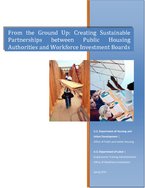Found 6 resources.
0
0
0
NLIHC stands ready to work with all members of Congress to seize the opportunity to address the full scope of affordable housing challenges for families with the greatest needs. In the memorandum below, we provide our recommendations on steps Congress can take—whether through an infrastructure spending package, the appropriations process, housing finance reform, or other legislative avenues—to make the critical investments in the affordable housing our nation needs to help the economy, our communities, children and families thrive.
Topics: Child welfare, Community development, Criminal justice, Funding, Homelessness, Housing, Legislation & Policy, Low-income, Mobility, Racial inequalities, Safety
 Shared by Housing Is
on Jan 30, 2019
Shared by Housing Is
on Jan 30, 2019 0
0
0
On January 1, 2014, in states that have chosen to expand Medicaid eligibility under the Affordable Care Act, nearly all chronically homeless people who lacked health insurance became eligible for Medicaid. This Primer offers state Medicaid officials and other interested parties strategies for using Medicaid to meet the needs of this very vulnerable population--some strategies that have succeeded in the past and some that are emerging under provisions of the Affordable Care Act.
Topics: Affordable Care Act, Criminal justice, Disabilities, Dual-eligibles, Funding, Health, Homelessness, Housing, Low-income, Medicaid / Medicare, Mental health, Partnerships, Stability, Substance abuse, Supportive housing
 Shared by Housing Is
on Jul 27, 2018
Shared by Housing Is
on Jul 27, 2018 0
0
0
Part of New York State’s Homelessness Action Plan includes an investment of new supportive housing resources and services over the next five years to address vulnerable populations experiencing homelessness. Therefore, the availability of and access to various support services such as employment and training opportunities, parenting, counseling, independent living skills training, primary healthcare, substance disorder treatment and mental health care, child care, and benefits advocacy are critical components of any project funded under this plan.
Topics: Cost effectiveness, Criminal justice, Disabilities, Domestic violence, Foster care, Funding, Homelessness, Housing, Medicaid / Medicare, Mental health, Substance abuse, Supportive housing, Youth
 Shared by Housing Is
on Jul 23, 2018
Shared by Housing Is
on Jul 23, 2018 0
0
0
Assisting public housing residents on the path towards self-sufficiency requires going beyond providing decent, safe, and affordable housing. Public housing residents may face barriers to employment, such as limited education, job skills and/or proficiency in the English language. This toolkit is a resource for both frontline staff and management. It offers examples of how partnerships between DOL and HUD can increase public housing resident employment and create mutual benefit for both agencies.
Topics: Criminal justice, Disabilities, Funding, Housing, Legislation & Policy, Low-income, MTW, Partnerships, Workforce development
 Shared by Housing Is
on Jul 19, 2018
Shared by Housing Is
on Jul 19, 2018 0
0
0
Recognizing the layers to developing a health and housing partnership, this Literature Review and Resource Bank is intended to provide background and data resources that can be used in grant applications or in conversations with potential funders in the effort to foster new health and supportive housing partnerships.
Topics: Cost effectiveness, Criminal justice, Data sharing, Dual-eligibles, Funding, Health, Homelessness, Housing, Low-income, Medicaid / Medicare, Mental health, Partnerships, Post-secondary, Preventative care, Research, Seniors, Substance abuse, Supportive housing, Youth
 Shared by Housing Is
on Jul 13, 2018
Shared by Housing Is
on Jul 13, 2018 0
0
0
This brief explores how state Medicaid agencies have utilized a variety of federal authorities and delivery systems to increase access to supportive housing services and highlights important implementation considerations.
Topics: Cost effectiveness, Criminal justice, Data sharing, Funding, Health, Healthy homes, Homelessness, Housing, Legislation & Policy, Low-income, Medicaid / Medicare, Mental health, Partnerships, Substance abuse, Supportive housing
 Shared by Housing Is
on Jul 10, 2018
Shared by Housing Is
on Jul 10, 2018 




